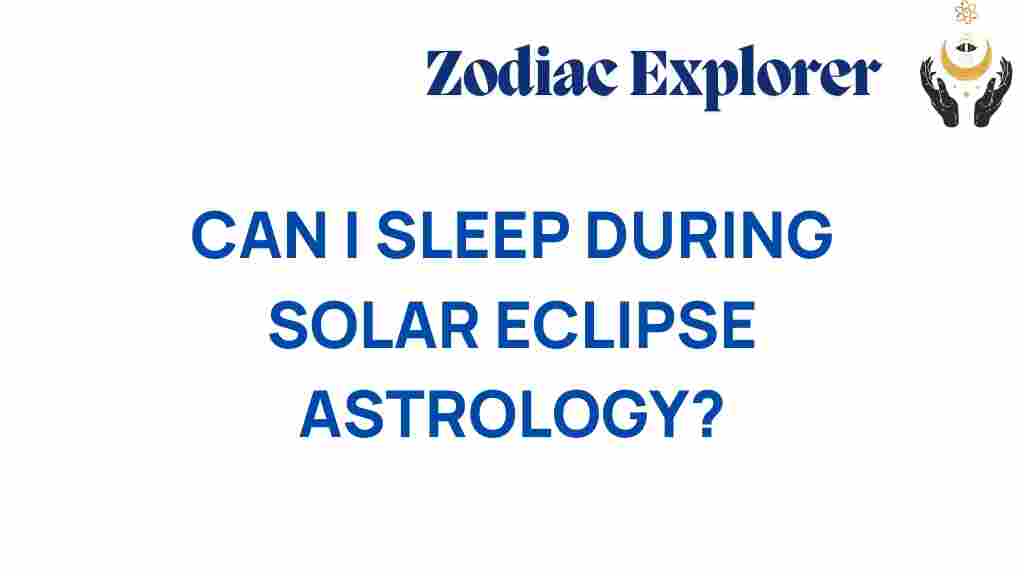The Hidden Impact of Solar Eclipse Astrology on Sleep Patterns
The phenomenon of a solar eclipse is not just a spectacular visual event; it also holds significant astrological implications that can influence various aspects of our lives, particularly our sleep patterns. In astrology, celestial phenomena such as solar eclipses are believed to bring about energy shifts that affect our physical and mental health. Understanding these impacts can enhance our awareness of our own sleep behaviors and overall well-being.
Understanding Solar Eclipses
A solar eclipse occurs when the moon passes between the Earth and the sun, temporarily blocking the sun’s light. This event can last for just a few minutes, but its astrological effects are thought to linger much longer. Astrologers often interpret solar eclipses as times of significant change, reflection, and new beginnings.
The Connection Between Solar Eclipses and Sleep Patterns
Astrology suggests that solar eclipses can create energy shifts that may influence our sleep patterns. During these cosmic events, many people report experiencing alterations in their sleep quality, duration, and even their dreams. Here are some ways solar eclipses can affect sleep:
- Heightened Energy Levels: The energy shifts during a solar eclipse can lead to increased levels of anxiety or excitement, making it difficult to relax and fall asleep.
- Introspection and Reflection: Eclipses often prompt introspection, causing some individuals to experience racing thoughts at night, disrupting their usual sleep patterns.
- Physical Symptoms: Some may experience headaches, fatigue, or other physical symptoms during an eclipse, which can also affect sleep quality.
Lunar Influence on Sleep Patterns
While solar eclipses are important, it is essential to consider the role of lunar influences as well. The moon has a well-documented impact on human behavior and physiology, including sleep. Here’s how lunar cycles interplay with sleep patterns:
- Full Moons: Many people report difficulty sleeping during full moons, which can occur close to a solar eclipse.
- New Moons: A new moon, which can coincide with a solar eclipse, is often linked to introspection and restfulness.
Understanding these lunar influences can help individuals prepare for the potential impacts of solar eclipses on their sleep.
Health Effects of Solar Eclipses and Sleep
Research in astrology and holistic health indicates that the health effects of solar eclipses can vary widely among individuals. Here are some common health effects associated with sleep and solar eclipses:
- Increased Stress Levels: The anticipation and excitement surrounding a solar eclipse can elevate stress, impacting sleep quality.
- Sleep Disorders: Those with pre-existing sleep disorders may find their symptoms exacerbated during eclipses.
- Physical Discomfort: Changes in atmospheric pressure and other environmental factors during an eclipse may lead to discomfort, affecting sleep.
Awareness of Energy Shifts
Being aware of the energy shifts during a solar eclipse can empower individuals to manage their sleep patterns effectively. Here are some strategies to enhance awareness and mitigate negative effects:
- Keep a Sleep Journal: Document your sleep patterns, emotional state, and any dreams during eclipses to identify trends.
- Practice Relaxation Techniques: Engage in meditation, deep breathing, or yoga to calm the mind before bed.
- Limit Screen Time: Reduce exposure to screens in the hour leading up to sleep to promote relaxation.
Step-by-Step Process to Manage Sleep During Solar Eclipses
To manage sleep effectively during solar eclipses, consider following this step-by-step process:
- Prepare Ahead: Anticipate the solar eclipse and mentally prepare for the energy shift.
- Create a Sleep-Friendly Environment: Ensure your bedroom is dark, quiet, and cool to promote restful sleep.
- Establish a Sleep Routine: Maintain a consistent sleep schedule, going to bed and waking up at the same times each day.
- Engage in Reflective Practices: Use the time surrounding the eclipse for journaling or meditation to process thoughts and emotions.
- Monitor Your Health: Pay attention to changes in your body and mind, and adjust your routine as needed.
Troubleshooting Tips for Sleep Disruptions
If you find yourself struggling with sleep during a solar eclipse, here are some troubleshooting tips:
- Consult a Sleep Specialist: If disruptions persist, consider speaking to a professional about your sleep patterns.
- Adjust Your Diet: Avoid heavy meals and caffeine close to bedtime to facilitate better sleep.
- Utilize Natural Remedies: Herbal teas like chamomile or valerian root may help promote relaxation and sleep.
Conclusion
The hidden impact of solar eclipse astrology on sleep patterns is a fascinating area of study that combines the mysteries of celestial phenomena with our daily experiences. By understanding the energetic shifts that occur during solar eclipses, individuals can better manage their sleep patterns and overall health. Awareness of these cosmic events provides an opportunity for introspection and personal growth, as well as a chance to engage in practices that promote restful sleep.
As we navigate the complexities of life, understanding how solar eclipses and lunar influences affect us can lead to enhanced well-being and a deeper connection to the cosmos. For those interested in exploring the astrological implications further, consider checking out resources that delve deeper into astrology and its effects on daily life here.
Remember, the next time a solar eclipse occurs, take a moment to reflect on how it may be impacting your sleep and overall health. Embrace the energy shifts, and use this cosmic event as an opportunity for growth and renewal.
For more information on health effects related to celestial phenomena, visit this page.
This article is in the category Myths and created by ZodiacExplorer Team
